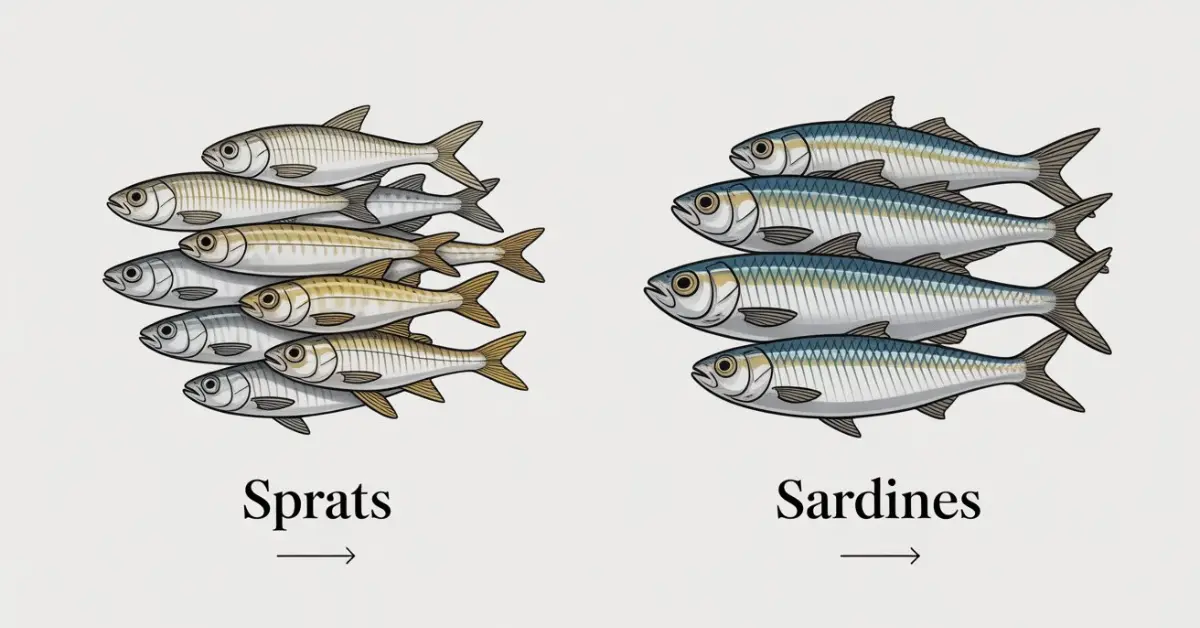When it comes to small, oily fish packed with nutrients, sprats vs sardines is a comparison that sparks curiosity among seafood lovers. Both belong to the Clupeidae family and are rich in omega-3 fatty acids, protein, and essential vitamins, yet they differ in taste, size, and nutritional balance.
Understanding these differences can help you decide which is better for your diet, taste preferences, or even your pets.
What Are Sprats vs Sardines?
Sprats and sardines are both small pelagic fish commonly found in cold and temperate waters. While they share similar characteristics, they come from different genera:
| Feature | Sprats | Sardines |
| Scientific Name | Sprattus sprattus (European sprat) | Sardinops or Sardina pilchardus |
| Family | Clupeidae | Clupeidae |
| Common Regions | North Atlantic, Baltic Sea | Mediterranean, Pacific, Atlantic |
| Size | 3–5 inches | 5–8 inches |
| Texture | Soft, delicate | Firm, meaty |
| Flavor | Mild, slightly sweet | Stronger, rich |
Fact: The term “brisling sardines” often refers to sprats that are canned and sold as sardines, especially in Northern Europe.
Physical and Taste Differences
Though both fish look similar, there are distinct physical and taste differences:
- Sprats are smaller and lighter in flavor, often used in smoked or pickled form.
- Sardines have a meatier texture and a more pronounced “fishy” taste, ideal for grilling or canning.
Taste comparison:
- Sprats: Mild, delicate, slightly sweet
- Sardines: Bold, savory, umami-rich
If you prefer a subtler seafood flavor, sprats may be your choice. But for those who love rich, hearty seafood, sardines win.
Nutritional Comparison: Sprats vs Sardines
Both are nutritional powerhouses, offering protein, omega-3 (EPA and DHA), and essential minerals. Here’s a quick nutritional comparison (per 100g):
| Nutrient | Sprats | Sardines |
| Calories | 180 kcal | 208 kcal |
| Protein | 17 g | 25 g |
| Fat | 10 g | 11 g |
| Omega-3 (EPA/DHA) | 1,400 mg | 1,500 mg |
| Calcium | 200 mg | 380 mg |
| Vitamin B12 | High | Very High |
| Vitamin D | Moderate | High |
| Mercury Content | Low | Low |
Both fish are low in mercury and rich in calcium, especially when eaten with bones.
Quote: “A can of sardines or sprats delivers more omega-3s than most fish oil capsules — naturally and sustainably.” — Marine Nutritionist Dr. Elaine Frost
Health Benefits of Sprats and Sardines
Eating these oily fish regularly can bring a range of benefits:
Key Health Benefits
- Heart health: Omega-3 fatty acids help lower cholesterol and triglycerides.
- Bone strength: High calcium and vitamin D support bone density.
- Brain development: DHA supports cognitive function.
- Anti-inflammatory properties: Reduces arthritis symptoms.
- Sustainable nutrition: Both are eco-friendly choices due to fast reproduction rates.
Sprats vs Sardines: Which is Healthier?
- Sardines contain more vitamin D and calcium, making them slightly better for bone and immune health.
- Sprats are smaller and often less processed, which can mean fewer additives in canned versions.
Sustainability and Environmental Impact
Both sprats and sardines are considered sustainable seafood options. However, the environmental impact varies slightly:
- Sardines are caught in large schools, often under strict fishery management.
- Sprats (especially Baltic sprats) have a stable population and are among the lowest-mercury fish.
Sustainability Tip: Choose brands that mention MSC-certified or sustainably sourced on packaging.
READ MORE >>> Mashable Connections Hint Today – Solve NYT Connections Like a Pro
Culinary Uses: How to Eat Sprats and Sardines
You can enjoy both fish in many ways:
Sprats
- Smoked sprats on toast
- Pickled sprats with onions
- Pan-fried sprats as appetizers
Sardines
- Grilled sardines with lemon and herbs
- Sardines on pizza or pasta
- Canned sardines in olive oil or tomato sauce
Substitution Tip:
You can substitute sprats for sardines in most recipes — but remember sprats are smaller and more delicate.
For Pets: Sprats vs Sardines for Dogs & Cats
Pet owners often wonder which is better for their pets. Both are safe and beneficial when fed in moderation:
| Pet | Recommended Fish | Benefits |
| Dogs | Sardines (in water, no salt) | Omega-3 for coat & joints |
| Cats | Sprats or sardines (unsalted) | Protein & eye health |
Avoid canned fish in brine or oil for pets — choose plain, water-packed options.
FAQs
Are sprats sardines?
No. Though related, sprats and sardines are different species within the same family.
Which has more omega-3, sprats or sardines?
Both have similar levels, but sardines slightly edge ahead.
Are sprats healthier than sardines?
Sprats are smaller and lower in fat, but sardines provide more calcium and vitamin D.
Can you eat the bones?
Yes! Both have soft, edible bones that are rich in calcium.
Case Study: The Mediterranean Diet Connection
A 2023 study on the Mediterranean diet highlighted that people who consumed small oily fish like sardines and sprats twice weekly had:
- 28% lower risk of cardiovascular disease
- 19% better bone density
- 15% improved cognitive function
This demonstrates how small, omega-rich fish play a huge role in long-term health.
Final Verdict: Which Is Better?
When comparing sprats vs sardines, the choice depends on your needs:
| Purpose | Winner | Why |
| For stronger flavor | Sardines | Rich and savory taste |
| For milder flavor | Sprats | Lighter and less “fishy” |
| For higher calcium | Sardines | Denser bones |
| For versatility | Tie | Both can be grilled, smoked, or canned |
| For pets | Sprats | Smaller and gentler on digestion |
| For sustainability | Tie | Both are eco-friendly fish |
Bottom Line: If you want a strong, nutrient-packed fish — go for sardines. If you prefer a light, delicate seafood flavor — choose sprats. Either way, both are healthy, affordable, and sustainable seafood choices.
📚 Quick Takeaways
- Both are rich in omega-3, B12, and calcium.
- Sardines are larger, stronger in flavor, and higher in calcium.
- Sprats are smaller, milder, and often smoked or pickled.
- Both support heart, brain, and bone health.
- Choosing either means supporting sustainable fishing practices.
Conclusion
The debate of sprats vs sardines isn’t about which fish is superior — it’s about what suits your taste and nutritional goals. Both belong to the same family, share similar omega-3, protein, and vitamin benefits, and play a vital role in a heart-healthy and sustainable diet. If you enjoy a milder, delicate flavor, sprats are perfect for your meals; if you prefer a richer, meatier taste with extra calcium and vitamin D, sardines take the lead.
Whether grilled, canned, or smoked, adding either fish to your diet is a smart, delicious, and eco-friendly choice that supports your health and the planet.

I’m Luna Hazel, a grammar expert here to help you master the art of clear, confident writing. Let’s make every word count!

